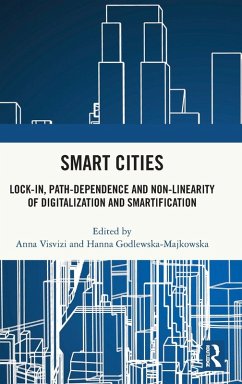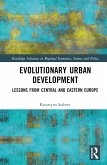Smart Cities
Lock-In, Path-Dependence and Non-Linearity of Digitalization and Smartification
Herausgeber: Visvizi, Anna; Godlewska-Majkowska, Hanna
Smart Cities
Lock-In, Path-Dependence and Non-Linearity of Digitalization and Smartification
Herausgeber: Visvizi, Anna; Godlewska-Majkowska, Hanna
- Gebundenes Buch
- Merkliste
- Auf die Merkliste
- Bewerten Bewerten
- Teilen
- Produkt teilen
- Produkterinnerung
- Produkterinnerung
This book seeks to identify and to examine factors and mechanisms underlying the growth and development of smart cities.
Andere Kunden interessierten sich auch für
![Ict, the Business Sector and Smart Cities Ict, the Business Sector and Smart Cities]() Ict, the Business Sector and Smart Cities201,99 €
Ict, the Business Sector and Smart Cities201,99 €![Planning, Housing and Infrastructure for Smart Villages Planning, Housing and Infrastructure for Smart Villages]() Hemanta DoloiPlanning, Housing and Infrastructure for Smart Villages181,99 €
Hemanta DoloiPlanning, Housing and Infrastructure for Smart Villages181,99 €![Creating Smart Cities Creating Smart Cities]() Creating Smart Cities181,99 €
Creating Smart Cities181,99 €![Evolutionary Urban Development Evolutionary Urban Development]() Katarzyna SadowyEvolutionary Urban Development167,99 €
Katarzyna SadowyEvolutionary Urban Development167,99 €![Property Asset Management Property Asset Management]() Douglas ScarrettProperty Asset Management161,99 €
Douglas ScarrettProperty Asset Management161,99 €![Megapolitan America Megapolitan America]() Arthur NelsonMegapolitan America179,99 €
Arthur NelsonMegapolitan America179,99 €![Entrepreneurship, Innovation and Smart Cities Entrepreneurship, Innovation and Smart Cities]() Vanessa RattenEntrepreneurship, Innovation and Smart Cities181,99 €
Vanessa RattenEntrepreneurship, Innovation and Smart Cities181,99 €-
-
-
This book seeks to identify and to examine factors and mechanisms underlying the growth and development of smart cities.
Hinweis: Dieser Artikel kann nur an eine deutsche Lieferadresse ausgeliefert werden.
Hinweis: Dieser Artikel kann nur an eine deutsche Lieferadresse ausgeliefert werden.
Produktdetails
- Produktdetails
- Verlag: CRC Press
- Seitenzahl: 222
- Erscheinungstermin: 26. August 2024
- Englisch
- Abmessung: 234mm x 156mm x 14mm
- Gewicht: 503g
- ISBN-13: 9781032539508
- ISBN-10: 103253950X
- Artikelnr.: 70291232
- Herstellerkennzeichnung
- Libri GmbH
- Europaallee 1
- 36244 Bad Hersfeld
- gpsr@libri.de
- Verlag: CRC Press
- Seitenzahl: 222
- Erscheinungstermin: 26. August 2024
- Englisch
- Abmessung: 234mm x 156mm x 14mm
- Gewicht: 503g
- ISBN-13: 9781032539508
- ISBN-10: 103253950X
- Artikelnr.: 70291232
- Herstellerkennzeichnung
- Libri GmbH
- Europaallee 1
- 36244 Bad Hersfeld
- gpsr@libri.de
Anna Visvizi, PhD (dr hab.), is an economist and political scientist, editor, researcher, and political consultant with extensive experience in academia, think-tank and government sectors in Europe and the United States, including the OECD. She is an Associate Professor at the SGH Warsaw School of Economics, Poland, Visiting Professor at Effat University, Saudi Arabia, and a Research Fellow at the Institute for Hellenic Growth and Prosperity (IHGP), at the American College of Greece. Her expertise covers issues pertinent to the intersection of politics, economics and ICT, especially AI and blockchain, in such domains as smart cities/smart villages, geopolitics, and business management. Hanna Godlewska-Majkowska - professor, head of Institute of Enterprise, Collegium of Business Administration at SGH Warsaw School of Economics, Poland; vice-rector at SGH Warsaw School of Economics in 2016-2020. Scientific interests, including issues in local and regional development, business location, and investment attractiveness of regions, are related to the function of an expert in local government units.
Acknowledgements Contributors Introduction Chapter 1: Not only technology: From smart city 1.0. through smart city 4.0 and beyond (an introduction) * Anna Visvizi * Hanna Godlewska-Majkowska Part 1: Spatial aspects of smart cities' growth and development Chapter 2 Path dependence, lock-in and non-linearity in the growth and development of smart cities * Hanna Godlewska-Majkowska Chapter 3 The smart city and its contexts: A focus on smart villages and smart territories * Malgorzata Dziembala * Rados
aw Malik * Anna Visvizi Chapter 4 Smartication, quality of life, and the challenges of urbanism: the case of the Line city * Abeer S. Y. Mohamed Chapter 5 Unveiling the Role of Urban Discontinuity on Equity in Public Green Open Spaces: The Case of Alexandria, Egypt * Shahira Assem Abdel-Razek * Sara Mohamed Sabry Zakaria Ibrahim Part 2: Territory, scale, inclusion, and participation in the smart city debate Chapter 6 Toward the metaverse. Smartification of public space management: what do we learn from smart cities in the EU? * Tomasz Pilewicz Chapter 7 Algorithms and Geo-Discrimination Risk. What Hazards for Smart Cities' development? * Ciro Clemente De Falco * Emilia Romeo Chapter 8 Generative AI (GenAI) and smart cities: efficiency, cohesion, and sustainability * Marco Moreno-Ibarra * Magdalena Saldaña-Perez * Samuel Pérez Rodríguez * Emmanuel Juárez Carbajal Part 3: Navigating the constraints of time, space, territory, and built environment in the smart city context Chapter 9 Smart city, ICT and older people: developing inclusive public space and housing conditions * Ewelina Szczech-Pietkiewicz * Zofia Szweda-Lewandowska * Joanna Felczak * Pawe
Kubicki Chapter 10 Smart transport systems and smart cities' growth and development. The case of Poland * Agnieszka Domäska * Rados
aw Malik Chapter 11 Automated vehicles in smart cities: Challenges pertaining to automated and connected transport. The case of Romania * Liliana Andrei * Oana Luca * Emanuel R
u
Chapter 12 Public-private partnership (PPP) and ICT in a mega-smart-city. The case of Istanbul * Sabina Klimek Chapter 13 An alternative view on smart cities: can small towns become smart? * Giovanni Baldi * Antonio Botti
aw Malik * Anna Visvizi Chapter 4 Smartication, quality of life, and the challenges of urbanism: the case of the Line city * Abeer S. Y. Mohamed Chapter 5 Unveiling the Role of Urban Discontinuity on Equity in Public Green Open Spaces: The Case of Alexandria, Egypt * Shahira Assem Abdel-Razek * Sara Mohamed Sabry Zakaria Ibrahim Part 2: Territory, scale, inclusion, and participation in the smart city debate Chapter 6 Toward the metaverse. Smartification of public space management: what do we learn from smart cities in the EU? * Tomasz Pilewicz Chapter 7 Algorithms and Geo-Discrimination Risk. What Hazards for Smart Cities' development? * Ciro Clemente De Falco * Emilia Romeo Chapter 8 Generative AI (GenAI) and smart cities: efficiency, cohesion, and sustainability * Marco Moreno-Ibarra * Magdalena Saldaña-Perez * Samuel Pérez Rodríguez * Emmanuel Juárez Carbajal Part 3: Navigating the constraints of time, space, territory, and built environment in the smart city context Chapter 9 Smart city, ICT and older people: developing inclusive public space and housing conditions * Ewelina Szczech-Pietkiewicz * Zofia Szweda-Lewandowska * Joanna Felczak * Pawe
Kubicki Chapter 10 Smart transport systems and smart cities' growth and development. The case of Poland * Agnieszka Domäska * Rados
aw Malik Chapter 11 Automated vehicles in smart cities: Challenges pertaining to automated and connected transport. The case of Romania * Liliana Andrei * Oana Luca * Emanuel R
u
Chapter 12 Public-private partnership (PPP) and ICT in a mega-smart-city. The case of Istanbul * Sabina Klimek Chapter 13 An alternative view on smart cities: can small towns become smart? * Giovanni Baldi * Antonio Botti
Acknowledgements Contributors Introduction Chapter 1: Not only technology: From smart city 1.0. through smart city 4.0 and beyond (an introduction) * Anna Visvizi * Hanna Godlewska-Majkowska Part 1: Spatial aspects of smart cities' growth and development Chapter 2 Path dependence, lock-in and non-linearity in the growth and development of smart cities * Hanna Godlewska-Majkowska Chapter 3 The smart city and its contexts: A focus on smart villages and smart territories * Malgorzata Dziembala * Rados
aw Malik * Anna Visvizi Chapter 4 Smartication, quality of life, and the challenges of urbanism: the case of the Line city * Abeer S. Y. Mohamed Chapter 5 Unveiling the Role of Urban Discontinuity on Equity in Public Green Open Spaces: The Case of Alexandria, Egypt * Shahira Assem Abdel-Razek * Sara Mohamed Sabry Zakaria Ibrahim Part 2: Territory, scale, inclusion, and participation in the smart city debate Chapter 6 Toward the metaverse. Smartification of public space management: what do we learn from smart cities in the EU? * Tomasz Pilewicz Chapter 7 Algorithms and Geo-Discrimination Risk. What Hazards for Smart Cities' development? * Ciro Clemente De Falco * Emilia Romeo Chapter 8 Generative AI (GenAI) and smart cities: efficiency, cohesion, and sustainability * Marco Moreno-Ibarra * Magdalena Saldaña-Perez * Samuel Pérez Rodríguez * Emmanuel Juárez Carbajal Part 3: Navigating the constraints of time, space, territory, and built environment in the smart city context Chapter 9 Smart city, ICT and older people: developing inclusive public space and housing conditions * Ewelina Szczech-Pietkiewicz * Zofia Szweda-Lewandowska * Joanna Felczak * Pawe
Kubicki Chapter 10 Smart transport systems and smart cities' growth and development. The case of Poland * Agnieszka Domäska * Rados
aw Malik Chapter 11 Automated vehicles in smart cities: Challenges pertaining to automated and connected transport. The case of Romania * Liliana Andrei * Oana Luca * Emanuel R
u
Chapter 12 Public-private partnership (PPP) and ICT in a mega-smart-city. The case of Istanbul * Sabina Klimek Chapter 13 An alternative view on smart cities: can small towns become smart? * Giovanni Baldi * Antonio Botti
aw Malik * Anna Visvizi Chapter 4 Smartication, quality of life, and the challenges of urbanism: the case of the Line city * Abeer S. Y. Mohamed Chapter 5 Unveiling the Role of Urban Discontinuity on Equity in Public Green Open Spaces: The Case of Alexandria, Egypt * Shahira Assem Abdel-Razek * Sara Mohamed Sabry Zakaria Ibrahim Part 2: Territory, scale, inclusion, and participation in the smart city debate Chapter 6 Toward the metaverse. Smartification of public space management: what do we learn from smart cities in the EU? * Tomasz Pilewicz Chapter 7 Algorithms and Geo-Discrimination Risk. What Hazards for Smart Cities' development? * Ciro Clemente De Falco * Emilia Romeo Chapter 8 Generative AI (GenAI) and smart cities: efficiency, cohesion, and sustainability * Marco Moreno-Ibarra * Magdalena Saldaña-Perez * Samuel Pérez Rodríguez * Emmanuel Juárez Carbajal Part 3: Navigating the constraints of time, space, territory, and built environment in the smart city context Chapter 9 Smart city, ICT and older people: developing inclusive public space and housing conditions * Ewelina Szczech-Pietkiewicz * Zofia Szweda-Lewandowska * Joanna Felczak * Pawe
Kubicki Chapter 10 Smart transport systems and smart cities' growth and development. The case of Poland * Agnieszka Domäska * Rados
aw Malik Chapter 11 Automated vehicles in smart cities: Challenges pertaining to automated and connected transport. The case of Romania * Liliana Andrei * Oana Luca * Emanuel R
u
Chapter 12 Public-private partnership (PPP) and ICT in a mega-smart-city. The case of Istanbul * Sabina Klimek Chapter 13 An alternative view on smart cities: can small towns become smart? * Giovanni Baldi * Antonio Botti








